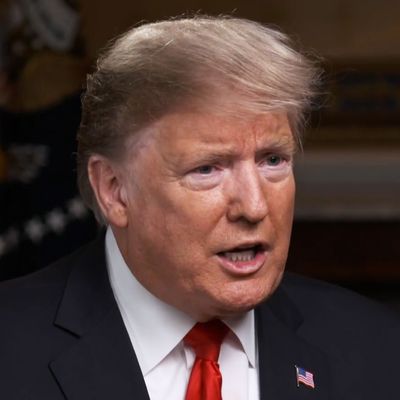
A little over two years ago, Colin Kaepernick kneeled during the national anthem because he believed that his country did not value “black” lives as much as it valued “white” ones. In his view, America’s failure to affirm the equal humanity of all its people was manifest in its tolerance for police violence against (disproportionately African-American) criminal suspects, and the mass incarceration of disproportionately black inmates, among other things.
Donald Trump disagreed. As other players joined Kaepernick’s protest movement, the president made restricting NFL players’ freedom of speech one of his top policy goals. In September 2017, Trump called on the league to “fire or suspend” players who kneel during the anthem. Last summer, the president argued that the protesters’ concerns were incoherent — even to themselves — tweeting, “Numerous players, from different teams, wanted to show their ‘outrage’ at something that most of them are unable to define.”
The president mocked the idea that NFL players’ lives were undervalued — or that they had any other cause for complaint with their great country — saying, “They make a fortune doing what they love. Be happy, be cool!”
In fact, Trump insisted that American society was putting too high a value on the players’ well-being. As evidence of football’s devastating effects on the human brain mounted — and the NFL responded by implementing (demonstrably inadequate) rule changes to modestly reduce the risk of its athletes suffering from Chronic Traumatic Encephalopathy (CTE) — the president argued that the game had grown insufficiently violent.
“Today, if you hit too hard, if they hit too hard, ‘15 yards, throw him out of the game,’” Trump groused in 2017. “They had that last week, I watched for a couple of minutes. Two guys, just really, beautiful tackle — ‘Boom, 15 yards.’ The referee gets on television, his wife is sitting at home she’s so proud of him — they’re ruining the game! Right? They’re ruining the game … they want to hit.”
These remarks heavily implied that Trump sees the lives of (disproportionately African-American) NFL players as fundamentally less valuable than those of wealthy, white people like himself. Then again, it was conceivable that the president was simply a CTE “truther,” and/or somehow did not understand that he was effectively arguing that maximizing his own entertainment should take precedence over minimizing the number of NFL players who suffer from lifelong neurological illness.
But on Super Bowl Sunday, Trump confirmed that he knew exactly what he was calling for. In an interview with CBS News, the president said that he does not want his youngest son Barron to play youth football because “I just don’t like the reports that I see coming out having to do with football ― I mean, it’s a dangerous sport. I thought the equipment would get better, and it has. The helmets have gotten far better but it hasn’t solved the problem.”
“I hate to say it because I love to watch football,” Trump continued, “but I really think that as far as my son ― well I’ve heard NFL players saying they wouldn’t let their sons play football. So … I would have a hard time with it.”
To review: The president of the United States says that:
(1) Pop Warner football isn’t safe enough for his son.
(2) The NFL is too safe for other (generally, less wealthy and white) people’s children.
(3) NFL players who claim to be outraged by the way America devalues the lives of people like them don’t even know what they’re upset about.
It’s enough to make one wonder if Donald Trump’s commentary on Kaepernick was something worse than “racially tinged.”






























